10 Secrets About the History of Heathers With Writer Daniel Waters
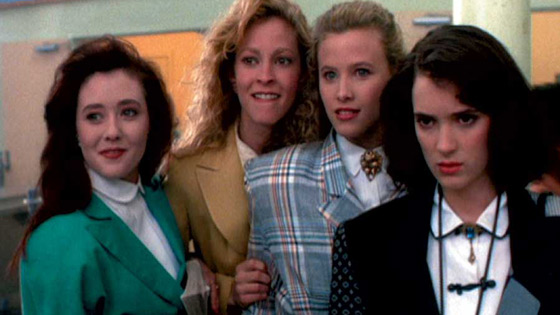 |
Heathers is one of the greatest films of and about the ’80s. Not only skewering the odd mix of cultural conservatism and libertine excess that still dominate high schools, writer Daniel Waters’ script is a classic: dark, sharp, funny, mean (and at the same time, oddly sympathetic to its characters, even at their worst). Released in the spring of 1989, the film launched Waters’ career, as well as that of its lead Christian Slater (J.D.), while kicking Winona Ryder’s (Veronica) career to the next level following the success of Beetlejuice. The cool girl who gets fed up with with being an in-crowd crony, and the homicidal outsider who becomes her boyfriend, lived in the bizarro universe where John Hughes movies weren’t afraid to use a pretty girl’s death by cleaning solution as a punchline.
To commemorate 25 years of Heathers, Waters and I spoke by phone recently, with the writer looking back at how it got made (with very little supervision), its legacy (say thank you, Joss Whedon), and how sometimes trying to get Winona Ryder off your back leads to a surprise sequel announcement.
10. You Too Can Make It Big With Your First Script
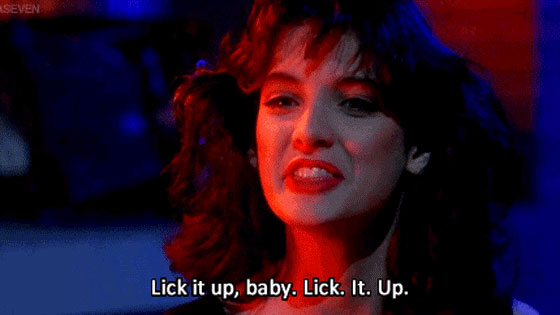 |
“I feel like all of the scripts now are reverse-engineered from screenwriting books like Save the Cat and telling you how to write a screenplay,” says Waters. By contrast, he told me that he wrote his first screenplay after looking in the newspaper and finding something missing in theaters.
“I approached [Heathers] from the point of ‘What would Stanley Kubrick do with the teen film?'” Waters explained. Looking back, the writer says teen films from the period were almost exclusively light and funny.
9. Waters Had No Idea What He Was Doing (or Hey Kids, It’s Okay to Make Something Unique and Weird*)
 |
“[Heathers] was written out of complete naivete,” Waters says.
You know all of those books, blog posts, and YouTube videos there are about the screenwriting process? Yeah, Waters didn’t have anything like that when he started crafting the Heathers screenplay back in the late ’80s.
Waters’ script – a cynical, anti-John Hughes film packed to the gills with murder, sex, and suicide featuring teens – is the exact opposite of what you’d call “commercial,” something he says is lacking in today’s product that makes its way to the big screen. Guys like Waters, Tarantino and Kevin Smith (when he used to not be terrible) relied on observation and a love of movies to create their stories – something missing today.
“Obviously, if this were a studio film or at a much bigger studio than New World, Heathers would have been stopped at the gate,” Waters suggested.
*Sadly, video stores are nearly extinct. RIP creepy back rooms where they kept the smut.
8. “I Never Met a Tone I Didn’t Like”
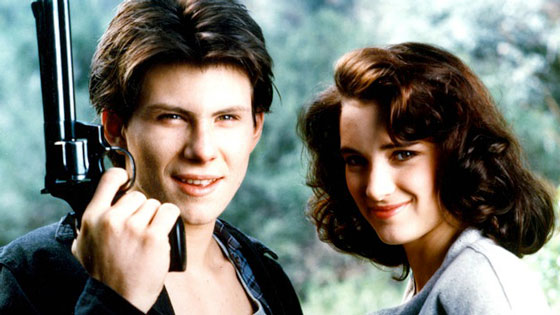 |
The finished version of Heathers is dark. But Waters admits that it could have been a far sillier film without some intervention.
“Of course, I worship Kubrick, but I have my silly Caddyshack side,” Waters explained. “Of course, my silly Caddyshack side has gotten me into trouble.”
Saying that he’s never met a tone that he didn’t like, Waters confessed that when writing, he’s often trying to cram as many movies into the one he’s creating as possible. If you think the pair of action comedies Hudson Hawk or Demolition Man turn on a dime, Waters would probably agree with you.
It would take a strong collaborator to untangle the many movies that were in the early versions of Heathers. Enter director Michael Lehmann.
7. Waters Wasn’t Director Michael Lehmann’s Biggest Fan (at First)
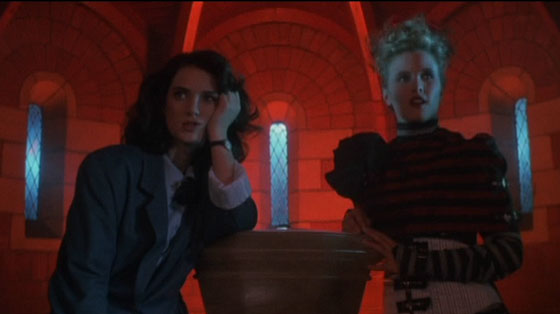 |
Waters passed along those first drafts of Heathers to friends attending USC. Some of those drafts made their way out to agents, while one copy ended up in the hands of the man who would go on to direct the film.
“A lot of my friends worked on Michael Lehmann’s student film and it kind of got to him. And at the time, he definitely was not my dream director,” Waters laughed.
Lehmann kept offering feedback on the script before having even met Waters, who recalls thinking, “I’m like, who is this knucklehead? Why does he keep giving notes?”
But because Lehmann and Waters (and later one of the film’s producers) ended up sharing an agent, Heathers somehow found its dream team behind the camera.
Waters also appreciated Lehmann’s contributions, offering that the director brought both “his pretentious, psychological side” while being “shameless about ruining a moment with a horrible pun.”
“[With] the combination of high pretension and low humor, we were perfect together.”
6. Waters Still Can’t Believe How Much They Got Away With
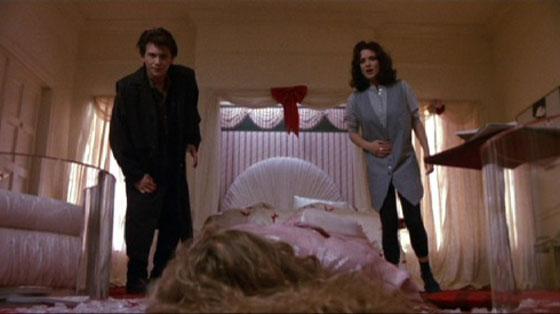 |
You couldn’t make a movie like Heathers back in the ’80s unless it was an afternoon special about the perils of suicide, or why Christian Slater is bad for the ladies (or something equally banal). Hell, with all of the moral panic about movies involving teen sex and violence, a modern studio probably wouldn’t touch Heathers with a 10-foot pole.
Waters says that at the time, he balked anytime the script would get notes, but marvels at what they were allowed to keep in.
“I never police myself,” Waters says. “So here I am thinking everyone is on my wavelength and only later did I find out I was way in left field.”
Some critics at the time agreed. The writer added, “One of my favorite reviews at the time said ‘Waters is chilling for what he assumes is common ground.'”
5. On Blowing up the School
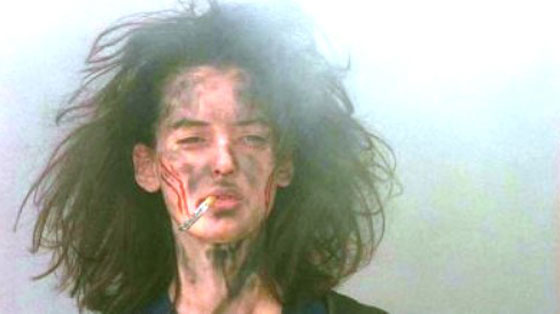 |
The “lost” ending of Heathers is legendary. In it, the school gets blown to bits with a prom in heaven closing out the action.
Waters walked me through some other planned dark endings that were shot down before shooting. “[In one], the kinds drink from a punchbowl containing the blue liquid that killed Heather Chandler.”
However, his favorite ending shares some bits of the current one, with a darker twist. “Veronica comes up to Martha at the end and says ‘Hey, you want to rent some new releases and pop some popcorn?’ And then Martha turns around and stabs her with a knife, and says ‘Fuck you, Heather.'” That scene would have ended with Veronica laying on the ground, bleeding and saying “My name is not Heather. My name is not Heather,” as Martha stands up from her wheelchair like Dr. Strangelove, saying “I can walk!”
Waters added that since “everyone was just so happy with the quasi-happy ending that we have now,” he decided to keep quiet about the alternate take.
4. “Mean Girls Is New Order to Heathers‘ Joy Division”
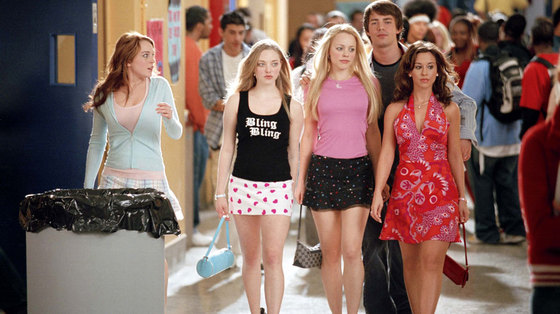 |
The closest we’ve come to a spiritual successor to Heathers here in the States is Mean Girls – and that’s according to the man who wrote Heathers. Of course, he could be a little biased: Mean Girls was directed by his brother Mark.
“You want a Heathers for the masses?” Waters joked. “Then let’s keep it all in the family and let my brother give it to you so the money can stay in my mother’s retirement fund.”
3. “The Enduring Legacy People Made More Money Than I Did”
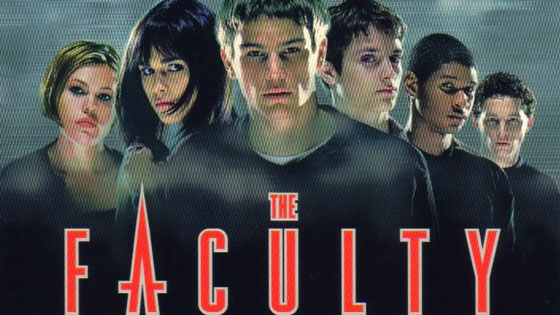 |
That sounds like a bitter dig at some of the filmmakers who followed and borrowed Heathers‘ legacy, but Waters is pretty kind to those writers and directors who were inspired by the film.
“People who will openly admit that they were inspired by Heathers like Kevin Williamson and Joss Whedon, those people found a way to take my prototype and build a sleeker vehicle from it.”
Waters notes that in the years immediately following the release of Heathers, he was often frustrated by fans who would ask him why he never made another film like it. But in recent years, its legacy (and his) have changed.
“In the 21st century, people come up to me and say ‘God, can you believe you were allowed to make Heathers?'”
2. Don’t Worry, Waters Explains Hudson Hawk
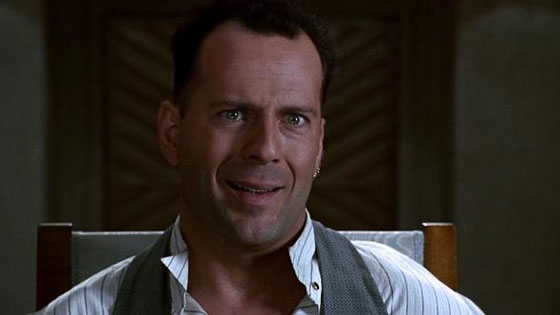 |
Waters’ post-Heathers career was fascinating. He wrote some of the odder and most interesting experiments in mixing action and comedy in the first half of the ’90s. There was the Gothic cool of Batman Returns and the corporate-branded futuristic muscle-fest that was Demolition Man.
But two of his films bombed completely at the box office – a pair of vanity projects for two actors at the heights of their professional power that a younger version of your writer loved when he was a teen: Hudson Hawk and The Adventures Of Ford Fairlane.
“Again, it goes back to my original premise that I love every kind of movie,” Waters said. “In retrospect, I probably should have experimented with one Joel Silver movie, not three of them.”
Those films were hugely hyped, propping up stars Bruce Willis and Andrew Dice Clay respectively (and bruising the careers of both – Clay never really recovered).
Waters wonders what would have happened if after Heathers, he simply stuck with churning out dark comedies. He suspects that he became rich at the wrong time. That doesn’t mean he necessarily thinks either of those movies is bad.
“I’ll half-defend the movies but definitely defend the scripts for Ford Fairlane and Hudson Hawk.” He continued “Still, I should have stuck to my own kind of thing, and my work in action films became the equivalent of putting a giraffe’s head on a rhinoceros’ body.”
1. The Heathers Sequel, or How to Keep Winona Ryder off Your Back
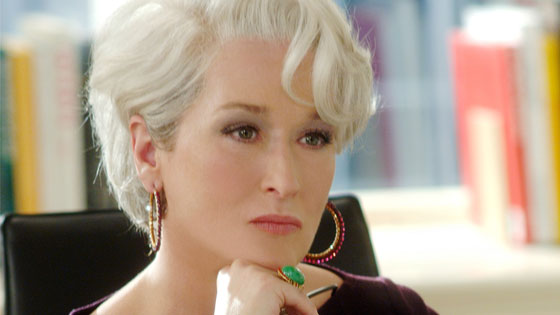 |
Veronica is dead to Daniel Waters. “In my original script for Batman Returns Catwoman dies, and in my original script for Heathers, Veronica dies.”
Still, Veronica lives and one of the movie’s biggest fans keeps bugging Waters to make a sequel, with one pitch heading into Dangerous Minds territory, seeing Veronica becoming a teacher and getting drawn into more murder. Another, more famous pitch traded the school house for the White House.
“Winona kept barking at me, so I kept throwing out ideas,” Waters said. “The most famous one that I gave her was that I had Veronica going to Washington as a Senate page, and meeting up with a Senator running for President, played by Meryl Streep whose name is Heather.”
Waters says that script would have been a political satire with Veronica assassinating the President by the end of the film. He didn’t think it would actually get made.
Never underestimate the power of Veronica.
“Winona said ‘I talked to Meryl Streep and she loves it.'”
But the sequel never happened. Waters says returning to those characters was never something he was passionate about, leaving us with only one stab at one of the greatest high school satires of all time.
Previously by Charles Webb
9 Things Zack Snyder’s Justice League Movie Had Better Not Do
8 Batman Characters Who Might Be the Arkham Knight
8 Things I Learned After a Week of Dying in Dark Souls II
8 Things I Learned While Surviving Space Camp
